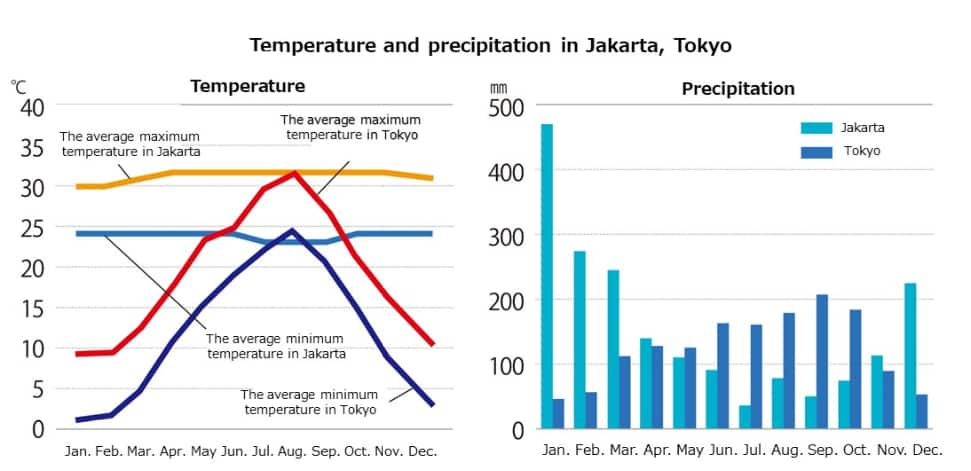- Please select the card you wish to join
-

Get your digital card immediately
No enrollment or annual fees
ANA Mileage Club Card
Earn more miles for your money
With credit function
ANA Card
-
Reservations
-
MILES
-
MILES
-
Login
-
Support
Jakarta
on December 10th, 2024 (JST) current information
Immigration and Visa
Visa
Visitors with a Japanese passport can obtain a Visa on Arrival (VOA) at the airport after arriving in Indonesia (only when visiting for tourism or business). The VOA costs Rp500,000 (paid in Indonesian rupiah, American dollars) and allows you to stay for up to 30 days. (It can be extended once for a further 30 days at one of the immigration offices.) You can also get an e-VOA (https://evisa.imigrasi.go.id/) on the immigration website before entry.The application for an electronic visa must be submitted between 14 days and 48 hours before arrival.
- Be sure to check the latest information as visa and entry requirements are subject to change.
Passport
When entering Indonesia, your passport must be valid for at least six months (at least 2 consecutive visa pages if you will go without a visa and 3 consecutive visa pages if you will apply for a visa).
Quarantine
When visiting from Japan, it is prohibited to bring the following items into Indonesia.
- Animals, fish, plants (including animal products, fish products, and vegetable products)
- Some fruit, vegetables, rice, and other such products may be brought into Indonesia after passing through an export inspection in Japan or obtaining an import permit issued by Indonesia. For details, see the Plant Protection Station website (http://www.maff.go.jp/pps/j/search/ekuni/as/keitai2.htm).
Customs
Electronic Customs Declaration (E-CD)
Customs declarations that had previously been distributed on the flight are now electronic. Before leaving, enter the required information on the Electronic Customs Declaration (E-CD) website. When you complete registration, you will receive a QR code to show customs at the airport on arrival in Indonesia. To allow you to show your QR code more easily, it is best to download or take a screenshot of it. You can register from three days before departure to the day of departure. Note that there are some fake websites that ask you to enter your credit card information after entering your personal details.
Bringing in e-cigarettes
E-cigarettes and heated tobacco products can be brought in, at an amount no more than 200 cartridges (tobacco leaf part) per adult.
For bringing and possession of tax-free cigarettes
200 cigarettes, 25 cigars, 100 g of cut tobacco, and 1 L of alcohol
Time difference and Daylight Saving Time
Time difference
Indonesia has three time zones: Western (Java, Sumatra, West Central Kalimantan), Central (Bali, Nusa Tenggara, Suawesi, Southeast Kalimantan), and Eastern (Papua). The capital of Jakarta is 2 hours behind Japan (GMT+7), and Bali is 1 hour behind Japan (GMT+8). Daylight saving time is not observed.
Climate
Climate
Because Indonesia is right on the equator and has a tropical climate, it has two seasons, the dry season and wet season. The dry season basically lasts from May to October, and the rainy season from January to April. The humidity is not too high in the dry season, making it a pleasant time. In the rainy season, there are squalls of heavy rain in the afternoon and high humidity.

Annual climate table for Jakarta
-
Monthly average temperature and precipitation
The average maximum temperature in Tokyo and Jakarta, The average minimum temperature in Tokyo and Jakarta
month The average maximum
temperature in TokyoThe average minimum
temperature in TokyoThe average maximum
temperature in JakartaThe average minimum
temperature in JakartaJan. 10℃ 2℃ 30℃ 24℃ Feb. 10℃ 2℃ 30℃ 24℃ Mar. 13℃ 5℃ 31℃ 24℃ Apr. 18℃ 10℃ 32℃ 24℃ May 23℃ 15℃ 32℃ 24℃ Jun. 25℃ 18℃ 32℃ 24℃ Jul. 28℃ 23℃ 32℃ 23℃ Aug. 31℃ 24℃ 32℃ 23℃ Sep. 27℃ 21℃ 32℃ 24℃ Oct. 23℃ 15℃ 32℃ 24℃ Nov. 17℃ 10℃ 31℃ 24℃ Dec. 13℃ 5℃ 31℃ 24℃ The average precipitation in Tokyo and Jakarta
month The average precipitation in Tokyo The average precipitation in Jakarta Jan. 40mm 470mm Feb. 50mm 270mm Mar. 110mm 250mm Apr. 120mm 130mm May 120mm 110mm Jun. 160mm 90mm Jul. 160mm 30mm Aug. 180mm 80mm Sep. 210mm 50mm Oct. 180mm 70mm Nov. 90mm 110mm Dec. 50mm 220mm
Currency and Exchange Rate, Tax, Currency exchange, Tip
Currency and Exchange Rate

The unit of currency is the Rupiah (usually written as Rp.). JPY1 is approx. Rp.105 (as of December 6, 2024). There are seven denominations of banknotes in circulation: Rp.1000, Rp.2000, Rp.5000, Rp.10000, Rp.20000, Rp.50000, and Rp.100000. There are four types of coins: Rp.100, Rp.200, Rp.500, and Rp.1000.
Tax
At most mid-level or better hotels, a tax (5% to 11%) and service charge (5% to 10%) are added to the room fee. Often, travelers are charged a service fee that is added onto fees incurred at upscale restaurants and beauty treatment salons.
In 2010, a value-added tax (VAT) refund system was put into place in Jakarta and Bali. Individuals carrying foreign passports are eligible (if the period of stay is within 2 months). The refund is subject to terms, such as spending a total of more than 5 million rupiah (tax excluded) during a single instance of shopping at specified shops.
Tip
Basically, tipping is not required when a service charge is included in restaurant and hotel fees. However, it is advisable to tip when receiving good service. The amount differs depending on the individual’s level of satisfaction, but the following values serve as references.
- Restaurants: Though it depends on the quality of the restaurant, a tip that is 5% to 10% of the meal charge is given when paying, or change from the bill is left at the table.
- Hotels/Spas: Tip approx. Rp.20000 to hotel porters and persons providing a massage.
- Taxis: It is customary to tell the taxi driver to keep the change.
Voltage and plug
Voltage

Some plugs can be used for Japanese electric products with an adapter
Voltage is 220V with a cycle of 50Hz. Generally, plugs are the 2-prong Type C with round pins. When using electric products made for use in Japan, a transformer and adapter are necessary.
Video and DVD
Video and DVD
The TV and video system in Indonesia (PAL) differs from that of Japan (NTSC), so media from Indonesia cannot be played on ordinary media players in Japan. The region code for DVDs is different in Indonesia and Japan. (It is 2 in Japan and 3 in Indonesia.) Pirated DVDs sold in places like Bali are often region free, but remember that it is illegal to bring these into Japan.
Blu-ray system
Blu-rays are region code A, the same as Japan.
Post offices in Indonesia are called POS INDONESIA. Mail sent by EMS can be tracked online.
Normal Business Hours
Mon. to Sat. 8:00 to 18:00 Also, stamps can be purchased at general stores. At luxury hotels, guests can ask the front desk to mail letters.
Postal Fees
Airmail to Japan costs Rp10,000 for a postcard, letters are from Rp10,000 calculated by weight, and EMS is from Rp310,000 up to 1 kg. Mail to Japan normally takes between 4 and 10 days (about 3 days for EMS).
Phone Call
How to phone
Telephoning Japan from Indonesia
Telephoning Japan from Indonesia
Dial 001, 007(International telephone identification number)
81 (Country Code, Japan )
X X(Remove the first 0 for area codes)
1234-5678 (Other parties telephone no.)
Telephoning Indonesia from Japan
Telephoning Indonesia from Japan
International Teleph+one Company No.
- 001 (KDDI)
- 0033 (NTT Communications)
- 0061 (SoftBank)
- 005345 (au Mobile) *1
- 009130 (NTT DoCoMo Mobile) *2
- 0046 (SoftBank Mobile)*3
010 (International Identification No.)
62 (Country Code, Indonesia)
123-4567 (Other parties telephone No.)
- *1.au does not require 005345.
- *2.Pre-registration to World Wing is required for NTT DoCoMo. Does not require 009130.
- *3.Call are possible without dialing 0046 from SoftBank.
- On a mobile phone, instead of 010, hold down 0 until + appears, then add the country code and the phone number.
- Pre-registration to World CALL is required for NTT DoCoMo.
Holiday / National holiday
Holiday / National holiday
The majority of national holidays follow various religious calendars. Aside from New Year’s, May Day, Pancasila Day, Independence Day, and Christmas, be aware of holidays that fall on different dates each year. In addition, the Galungan holiday is only celebrated in Bali, but note that many shops are closed around then (February 28 and September 25, 2024).
2025
- January 1: New Year’s Day
- January 27: Ascension of the Prophet Muhammad*1
- January 28: Government-designated holiday*1
- January 29: Imlek (Lunar New Year’s Day)*1
- March 28: Government-designated holiday*1
- March 29: Nyepi (Hindu New Year’s Day)*1
- March 31, April 1 : Idul Fitri (celebration at the end of fasting)*1
- April2~4: Government-designated holiday*1
- April 7: Government-designated holiday*1
- April 18: Good Friday*1
- April 20: Easter Day*1
- May 1: May Day
- May 12: Waisak Day (Buddha’s Anniversary)*1
- May 13: Government-designated holiday*1
- May 29: Ascension Day of Jesus Christ*1
- May 30: Government-designated holiday*1
- June 1: Pancasila Day (commemorates the five founding principles of the state)
- June 6: Idul Adha (Muslim Day of Sacrifice)*1
- June 9: Government-designated holiday*1
- June 27: Islamic New Year’s Day*1
- August 17: Indonesian Independence Day
- September 5: The Prophet Muhammad’s Birthday*1
- December 25: Christmas Day
- December 26: Government-designated holiday*1
- *1.Holidays that fall on different dates each year
Language
Language
The official language is Indonesian. Languages unique to various areas in Indonesia are also spoken, such as Javanese and Balinese. English is often understood in places such as resort areas in Bali and Jakarta.
Business hours, etc
Business hours
Below are guidelines for general business hours, which differ by shop, restaurant, and area.
Banks
Mon. to Fri. 9:00 to 16:00, Sat. 9:00 to 12:00, closed on Sun., holidays.
Shops
Normally, shops in cities and tourist areas are open every day from around 10:00 to 21:00. Many convenience stores are open 24 hours.
Restaurants
Normally, restaurants in cities and tourist areas are open every day from around 10:00 to 22:00. Orders are no longer taken from 30min. to one hour before closing. In tourist areas, some restaurants stay open until very late at night or for 24 hours.
Age Limit
In some instances, there is a child’s entrance fee for children 12 years old or younger at tourist locations, etc. Age restrictions on alcohol consumption and smoking are not regulated by law. Usually, many individuals who drink or smoke start around 17 years old.
Manners
During the Nyepi New Year, going out and lighting fires is prohibited in Bali. Even travelers will be arrested by police if they venture outside the hotel, unless it is an emergency. In addition, do not use the left hand, which is considered the unclean hand, to hold food or shake hands. Also, the head is considered a sacred place where the spirit resides, so people should not touch another person’s head, even the head of a child. Many citizens are Muslims and do not consume alcohol or pork.


